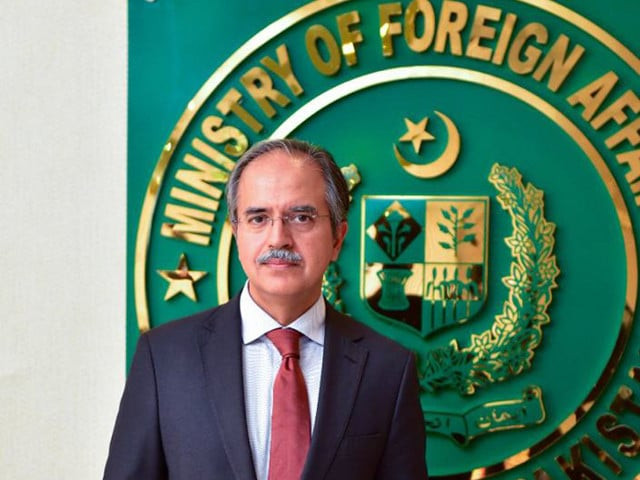FO rubbishes claims ex-PM, FM kept in dark about ‘cypher’
PTI leader had claimed that diplomatic cable on ‘regime change conspiracy’ was with powerful quarters of the country

The issue of secret diplomatic cable that was at the center of controversy ahead of no-confidence vote against former prime minister Imran Khan is once again at the limelight when a PTI leader claimed that ‘cypher’ was initially withheld from Imran and then foreign Minister Shah Mehmood Qureshi.
Shahbaz Gill, PTI Chairman’s Chief of Staff, told reporters outside the Supreme Court on Tuesday that he was told by the former foreign minister that the diplomatic cable was kept hidden from him and Imran Khan.
He said that the diplomatic cypher was with ‘powerful quarters’ and Qureshi on finding out about the cypher had said, “Why it was not shared with me?”
The foreign office, however, dismissed the claim terming it “entirely baseless” that the Cypher Communication received from the Embassy in Washington was ‘hidden’ from the Foreign Minister or Prime Minister.
“Such a question simply does not arise. The Foreign Office operates on a professional basis and it would be detrimental to cast aspersions on its working,” the foreign office spokesperson said in a statement.
Also read: No evidence opposition colluded with foreign state, says SC
A source explained that there were laid down protocols for the cypher communications particularly that received from important countries. Under the standard operating procedures, all the relevant figures including the president, prime minister, foreign minister, the army chief and DG ISI receive such diplomatic cables.
There was no question of bypassing the well-established protocol, the source added.
The cypher in question was the basis of Imran Khan’s claims that he was ousted from power through a well-orchestrated US conspiracy.
The secret diplomatic cable details a meeting between Pakistan’s then Ambassador to Washington Asad Majid and US Under Secretary for South and Central Asia Donald Lu. In that meeting, the US official conveyed the Biden administration’s reservations over Pakistan’s “neutral” stance on the Russia-Ukraine conflict.
The Pakistani envoy was in particular conveyed displeasure of the US over Imran Khan’s visit to Moscow at a time when President Putin was preparing for invading Ukraine.
Also read: PTI leader critical of Establishment’s role in politics
What caused the political storm and controversy was the claim by Imran that in that secret cable the US official warned Pakistan of dire consequences if the vote of no confidence against him was not successful.
Imran went on to add that the US official told the Pakistani envoy that Islamabad would be forgiven if the no-trust motion succeeded.
The issue of diplomatic cable and alleged US conspiracy was twice discussed by the country’s high-powered National Security Committee (NSC) once when Imran was still the prime minister and second time when he was ousted from power.
In both those closed door meetings, the military leadership stated categorically that there was no evidence of US conspiracy. But Imran insisted that the NSC admitted that there was “interference”, something according to him warranted a thorough probe.
During the question-answer session, the spokesperson said that Pakistan’s former ambassador to the US Asad Majeed briefed the National Security Committee (NSC) on the context and content of his telegram. The NSC after examining the contents of the communication, reaffirmed the decisions of the last NSC meeting, he maintained.
“The committee was again informed by the premier security agencies that they have found no evidence of any conspiracy. Therefore, the NSC after reviewing the contents of the communication, the assessments received, and the conclusions presented by the security agencies, concluded that there has been no foreign conspiracy.”
Commenting on some media speculations or rumors about some statements attributed to Ambassador Asad Majeed, the spokesperson termed them “baseless and totally incorrect”. “There was no pressure of any kind on the ambassador at any time. And there is no possibility of any editing of the communication.”
On a question to clarify difference between ‘interference’ and ‘conspiracy’, the FO spokesperson said, “I think it is not for me to get into the meaning and semantics of these terms. It is quite clear the matter has been adequately and sufficiently discussed and addressed in the meetings of the NSC.”
On a question about the communication being withheld, he stated categorically that “such assertions are unfounded”. “There is no question or possibility of hiding or holding back something like that. It was a Cypher Telegram, which is an accountable and classified document, whose handling and access are strictly in accordance with relevant cypher instructions and procedures. The Telegram was duly received at the Foreign Office and immediately distributed to the relevant authorities,” he added.
“As for the exact contents of the demarche, I think it is not appropriate to mention that publically. It was decided by the NSC that demarches be made in keeping with diplomatic norms.”



1724319076-0/Untitled-design-(5)1724319076-0-208x130.webp)















COMMENTS
Comments are moderated and generally will be posted if they are on-topic and not abusive.
For more information, please see our Comments FAQ